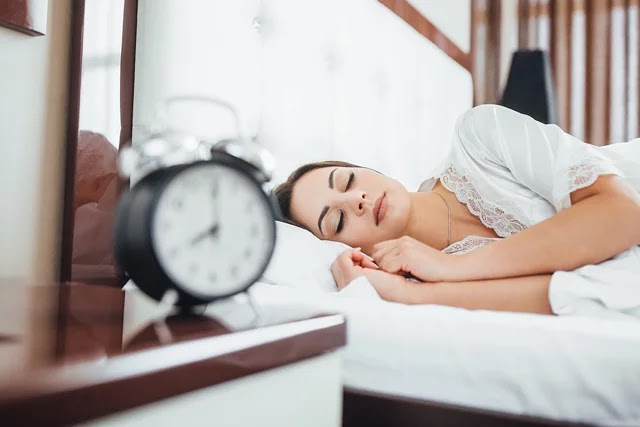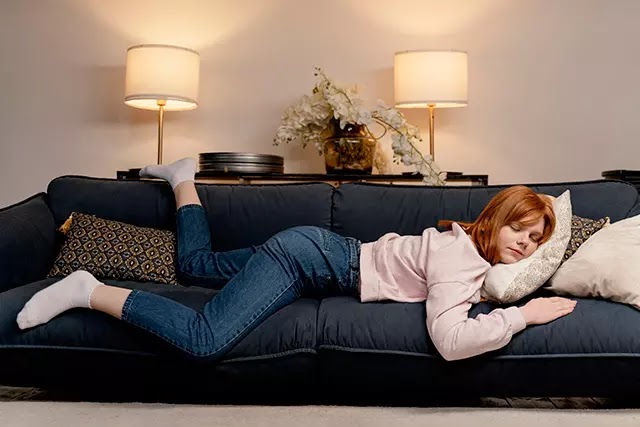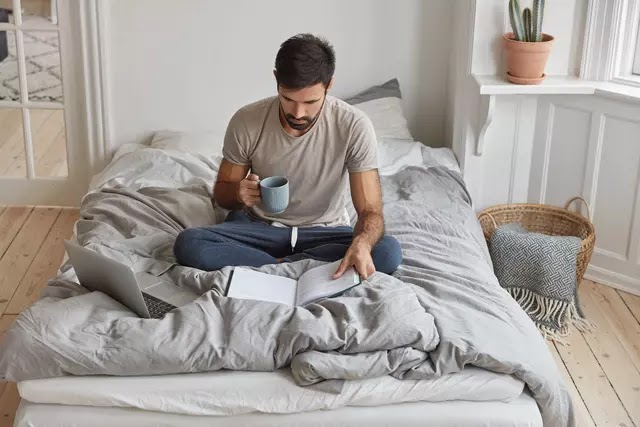How to Sleep Better
Your behaviors during the day, and especially before bedtime, can have a major impact on your sleep. Your daily routines – what you eat and drink, the medications you take, how you schedule your days and how you choose to spend your evenings – can significantly impact your quality of sleep. Read our article on 'How To Sleep Better' to establish healthy sleep habits. Here are some healthy sleep tips.
Despite the importance of sleep, a lot of people regularly fail to get enough sleep. This is because they are too tired during the day. Although there are many causes of sleep problems, many of these are linked to specific steps that can help improve a person's sleep. For many people, trying to implement all these strategies can be overwhelming. But some of these are simple and can be implemented at home. You can start with small changes and work your way up toward healthier sleep habits, also known as sleep hygiene.
A good night’s sleep is just as important as regular exercise and a healthy diet. Sleep research shows getting too poor quality sleep is known to have negative effects on your hormones and metabolic function. It can also lead to weight gain and increase your risk for various illnesses.
Over the years, the quantity and quality of sleep have declined. This means that many people are not getting enough sleep. Getting good sleep is important to achieving a healthy and balanced lifestyle. If you want to optimize your health or lose weight, getting a good night’s sleep is one of the most important things you can do. Here are evidence-based tips to sleep better at night.
See also: Mattress Reviews
How to Create the Perfect Bedroom for Sleep
Creating a relaxing and comfortable bedroom environment will help you fall asleep quickly and easily. In designing your sleep environment, focus maximizing comfort and minimizing distractions, including with these healthy sleep tips:
- Choose Quality Bedding : A quality bedding set will help you feel welcomed and comfortable throughout the night.
- Use a High-Performance Mattress and Pillow : A good mattress and pillow are important to making sure that you get the proper support and comfort for your body. A high-quality mattress can help lower stress and improve sleeping comfort.
- Cultivate Peace and Quiet : Having a quiet bedroom is important to making sure that you get enough sleep. Having a white noise machine or a fan is a great way to drown out the noise from nearby sources.
- Find an Agreeable Temperature : Ideally, the ideal temperature should be set at 65 degrees Fahrenheit to avoid being too hot or too cold. This is the temperature that's ideal for sleeping.
- Introduce Pleasant Aromas : A light scent that's relaxing can help you sleep. Use essential oils with natural aromas, such as lavender to introduce a fresh and sweet smell to your bedroom.
- Avoid Light Disruption : Too much light can disrupt your sleep and circadian rhythm. To prevent this, block out the light with curtains or a sleep mask.
How Do You Optimize Your Sleep Schedule?
 |
| Pick a wake-up time and stick with it, even on weekends or other days when you would otherwise be tempted to sleep in. |
Establishing a daily sleep routine can help you getting better sleep. To start harnessing your daily sleep schedule for your benefit, try implementing these four strategies:
- Set a Fixed Wake-Up Time : It can be challenging to get used to a healthy sleep routine when you wake up at different times of the day. Pick a wake-up time and stick with it, even on weekends or other days when you would otherwise be tempted to sleep in. This will help you.
- Be Careful With Naps : Naps are important to help you sleep better. However, they should be taken with caution. The best time to nap is shortly after lunch in the early afternoon, and the best nap length is around 20 minutes.
- Budget Time for Sleep : It's important to establish a budget for the amount of sleep that you should get each night. Considering your fixed wake-up time, work backwards and identify a target bedtime. This can be done by planning ahead and identifying a bedtime that works for you.
- Adjust Your Schedule Gradually : You can gradually adjust your sleep schedule by making small changes over time. This method will help you get used to the changes and ensure that you are staying on schedule.
 |
| Naps are important to help you sleep better. However, they should be taken with caution. The best nap length is around 20 minutes. |
How to Build a Pre-Bed Routine
If you have a hard time falling asleep, it’s natural to think that the problem starts when you lie down in bed. Unfortunately, many people tend to make poor habits that can contribute to sleep problems. Poor pre-bed habits are a major contributor to insomnia and other sleep problems. Changing your sleep habits can help make you feel better about yourself and get rid of the stress.
Having a consistent routine helps keep you on track and helps build a healthy and balanced lifestyle. As much as possible, try to create a consistent routine that you follow each night because this helps reinforce healthy habits and signals to mind and body that bedtime is approaching. As part of that routine, incorporate these three tips:
- Wind Down For At Least 30 Minutes : Getting into the right frame of mind can help you fall asleep easily. Do quiet reading, active movements, listening to music and exercises at least 30 minutes before going to sleep.
- Disconnect From Devices : Smartphones and tablets keep your brain wired, which can make it hard to truly shut down. They can also suppress the natural production of melatonin.
- Lower the Lights : Lower the lights can help you get ready to fall asleep and avoid the effects of bright light on the body.
How to Foster Pro-Sleep Habits During the Day
 |
| Reserve your bed for sleep and sex only. Do not use your bed for eating or working. |
Getting a good night’s sleep is an all-day affair. There are a few simple steps that can help you achieve this goal:
- See the Light of Day : Our internal clocks are regulated by the light exposure that we get. Getting enough daylight early in the day can help regulate our circadian rhythm. Sunlight has the strongest effect, so try to take in daylight by getting outside or opening up windows or blinds to natural light.
- Find Time to Move : Daily exercise has numerous health benefits, and it can help improve sleep. Most experts advise against intense exercise close to bedtime because it may hinder your body’s ability to effectively settle down before sleep.
- Don’t Eat Too Late : It can be hard to fall asleep if you're still digesting a large meal. To minimize this effect, try avoiding late dinner and avoiding certain food groups.
- Be Mindful of Alcohol : Drinking alcohol can induce drowsiness, which can affect sleep quality. It’s best to avoid this before bed.
- Monitor Your Caffeine Intake : Caffeinated beverages, including coffee, tea, and sodas, can prev ent you from falling asleep. To avoid this, keep an eye on your caffeine intake and avoid it later in the day when it can be a barrier to falling sleep.
- Don’t Smoke : Being exposed to smoke has been linked to a variety of sleeping problems. These include difficulty sleeping and fragmented sleep.
- Reserve Your Bed for Sleep and Sex Only : You want a strong mental association between your bed and sleep, so try to keep activities in your bed limited strictly to sleep and sex.
What Should I Do If I Can't Fall Asleep?
Getting stuck in bed can be hard to avoid. There are a few simple steps to help you get back to sleep:
- Try Relaxation Techniques : Instead of focusing on trying to fall asleep, try relaxing techniques that can help get you back to sleep. Some of these controlled breathing, mindfulness meditation, progressive muscle relaxation, and guided imagery.
- Experiment With Different Methods : Sleeping problems can be complex and what works for one person may not work for someone else. As a result, it makes sense to try different approaches to see what works for you. Just remember that it can take some time for new methods to take effect, so give your changes time to kick in before assuming that they aren’t working for you.
- Don’t Stew in Bed : Getting restless while sleeping can trigger thoughts of frustration and bed-related issues. This means that if you’ve spent around 20 minutes in bed without being able to fall asleep, get out of bed and do something relaxing in low light. Avoid checking the time during this time. Try to get your mind off of sleep for at least a few minutes before returning to bed.
- Keep a Sleep Diary : A sleep diary can help keep track of how well you're sleeping and identify possible factors that might be affecting it. It can also help you monitor other sleep hygiene changes.
- Talk With a Doctor : Having a doctor is the best way to talk about your sleep problems. He or she can provide helpful advice on how to manage these conditions, and how they can affect your health and safety. Talk with your doctor.
Learn more










Post a Comment
0 Comments